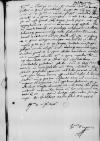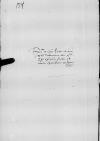List #2075
Ioannes DANTISCUS do Tiedemann GIESEHeilsberg (Lidzbark Warmiński), 1539-02-24
Regest polski:
Dantyszek zapoznał się z wyjaśnieniami rady Gdańska i Johanna von Werden. Zgodnie z przewidywaniami adresata, rozliczenie źle o nich świadczy. Dantyszek spodziewa się pogorszenia sytuacji po najbliższym sejmie koronnym w Krakowie. Po rozważeniu, co napisać królowi [Zygmuntowi I], decyduje, że list należy sformułować tak, jak uczynił to Giese, prosi jednak, by dodać, że to, co on sam w tych sprawach napisał, napisał we wspólnym imieniu [członków Rady Pruskiej].
Dantyszek obiecuje dopilnować, by na sejmie zwrócono Giesemu wiatyk dany gońcowi.
Dantyszek przesyła list doktora [Stanisława] Hozjusza. Obawia się wojny z Turcją, wywołanej gniewem sułtana [Sulejmana Wspaniałego] z powodu małżeństwa Izabelli [Jagiellonki z Janem Zápolyą]. Sułtan zamierza zająć lub nękać Węgry. Ponieważ jego flota uległa zniszczeniu, zamierza walczyć wyłącznie na lądzie.
| odebrano 1539-02-26 Rękopiśmienne podstawy źródłowe:
Publikacje:
| ||||||||
Tekst + aparat krytyczny + komentarz Zwykły tekst Tekst + komentarz Tekst + aparat krytyczny
Reverendissimo in Christo Patri et Domino, domino
Reverendissime in Christo Pater et Domine, frater et amice carissime et honorande.
Salutem et fraternam commendationem.
Legi ea omnia, quae
Viaticum, quod Dominatio Vestra Reverendissima dabit veredario, curabitur, ut in
Mitto domini doctoris
Dominationem Vestram Reverendissimam diutissime optime valere summopere cupio.
Ex
Reverendissimae Dominationis Vestrae frater integerrimus
[1 ] Neither the letter from the
[2 ]
The first draft of cf.
[3 ] On January 28, 1539, the marriage of

